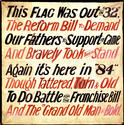 Calls for working people to be in Parliament were made in the 1830s. One of the demands of the Chartist movement of the late 1830s and early 1840s was for an end to the requirement for Members of Parliament to own property. But it is from the 1860s that attempts to achieve this became more frequent.
Calls for working people to be in Parliament were made in the 1830s. One of the demands of the Chartist movement of the late 1830s and early 1840s was for an end to the requirement for Members of Parliament to own property. But it is from the 1860s that attempts to achieve this became more frequent.
 The vote had been given to many working men in Glasgow in 1868, but even more important was the fact that skilled workers were becoming more organised in their trade unions. The Glasgow Trades Council had been formed in 1858 and throughout the 1860s was active in supporting campaigns for political reform. There were a number of unsuccessful attempts to get working men elected to the town council under the banner of Liberalism in the 1870s. In the 1880s, economic depression, demands for land reform (by the breaking up of the great estates to allow tenants to acquire their farms) and disenchantment with the Liberal Party all came together to intensify the call for reform. A Scottish Land Restoration League put up five candidates in the 1885 general election, three in Glasgow, one in Partick and one in Greenock.
The vote had been given to many working men in Glasgow in 1868, but even more important was the fact that skilled workers were becoming more organised in their trade unions. The Glasgow Trades Council had been formed in 1858 and throughout the 1860s was active in supporting campaigns for political reform. There were a number of unsuccessful attempts to get working men elected to the town council under the banner of Liberalism in the 1870s. In the 1880s, economic depression, demands for land reform (by the breaking up of the great estates to allow tenants to acquire their farms) and disenchantment with the Liberal Party all came together to intensify the call for reform. A Scottish Land Restoration League put up five candidates in the 1885 general election, three in Glasgow, one in Partick and one in Greenock.
 Branches of the Social Democratic Federation and the Socialist League were formed and in August 1888 Keir Hardie (1856-1915), having stood as a workingman's candidate in the Mid-Lanark by-election earlier in the year, formed the Scottish Labour Party. The first trade-union backed candidate, Henry Tait, was elected to the town council in 1889, generally following the Liberal line in policy, but in the expanded town council of 1896 there were eight so–called Labour "Stalwarts". With the formation of the Independent Labour Party (ILP) in 1893, into which the Scottish Labour Party merged, there was growing support for developing policies and putting up candidates separately from the Liberal Party. Five ILP candidates stood in Glasgow in the 1895 election, again without success. Support spread slowly, but on the initiative of George Carson, a Scottish Workers’ Parliamentary Elections Committee was formed in January 1900. The aim was to get working men into Parliament and its activities bore fruit in the 1906 election when George Barnes (1859-1940) was elected as Labour Member for Blackfriars and Hutchesontown. Despite much activity by the ILP, electoral success was slow to come, but a city-wide Labour Party was formed in 1912 and, in the again enlarged city council, twelve Labour members were elected.
Branches of the Social Democratic Federation and the Socialist League were formed and in August 1888 Keir Hardie (1856-1915), having stood as a workingman's candidate in the Mid-Lanark by-election earlier in the year, formed the Scottish Labour Party. The first trade-union backed candidate, Henry Tait, was elected to the town council in 1889, generally following the Liberal line in policy, but in the expanded town council of 1896 there were eight so–called Labour "Stalwarts". With the formation of the Independent Labour Party (ILP) in 1893, into which the Scottish Labour Party merged, there was growing support for developing policies and putting up candidates separately from the Liberal Party. Five ILP candidates stood in Glasgow in the 1895 election, again without success. Support spread slowly, but on the initiative of George Carson, a Scottish Workers’ Parliamentary Elections Committee was formed in January 1900. The aim was to get working men into Parliament and its activities bore fruit in the 1906 election when George Barnes (1859-1940) was elected as Labour Member for Blackfriars and Hutchesontown. Despite much activity by the ILP, electoral success was slow to come, but a city-wide Labour Party was formed in 1912 and, in the again enlarged city council, twelve Labour members were elected.